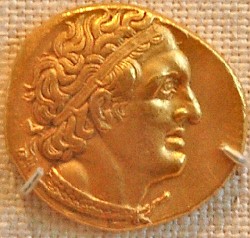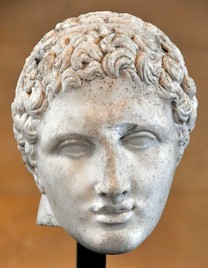Diadochi 7: The Fourth Diadoch War (1)
Diadochi ("successors"): name of the first generation of military and political leaders after the death of the Macedonian king and conqueror Alexander the Great in 323 BCE. To settle the question whether his empire should disintegrate or survive as a unity, and, if so, under whose rule, they fought several full-scale wars. The result, reached by 300, BCE, was a division into three large parts, which more or less coincided with Alexander's possessions in Europe, Asia, and Egypt.
During the next quarter of a century, it was decided whether these states could endure. As it turned out, there were no great territorial changes, although there were dynastic changes. After 280, the period of state-forming came to an end with three great states: Antigonid Macedonia, Ptolemaic Egypt, and the Seleucid kingdom in Asia.

In the meantime, Ptolemy had added Cyprus to his territories (309), and moved to the Aegean Sea, where he gained a bridgehead on the island Cos. From there, he sailed to Delos, where he reorganized the Nesiotic League (above), which would support the ruler of Egypt.
Antigonus Monophthalmus now was compelled to focus on the west, where he used a stratagem against Cassander. He sent a bastard son of Alexander the Great, named Heracles, and his mother Barsine, to Polyperchon in the Peloponnese. The old general could use mother and son to raise support for a revolt against Cassander. However, Cassander convinced Polyperchon to side with him, and the young man was killed.
Ptolemy landed at Corinth, where he repeated his declaration that he supported the free and autonomous Greek towns, a move that did little to endear him to Cassander, and - worse - was considered hypocritical, because he made his support conditional on the financial contributions that he demanded. Understanding that he had made a mistake, he cut his losses, left Europe and retired to Egypt (early 308). Another reason may have been that by now, Antigonus' army had arrived in Syria. It had been defeated by Seleucus, but was still powerful and dangerous. Therefore, Ptolemy returned.
In 307, Antigonus decided upon a show of strength in the Aegean. This was the beginning of the Fourth Diadoch War. His son Demetrius, who had by now shown his valor as a warrior, was sent to Greece: he brought the Nesiotic League under control again, and unexpectedly landed at Athens, where he was recognized as liberator and god (10 June; text). Cassander's garrisons and his governor Demetrius of Phaleron were expelled, and the democracy was restored. The Athenians immediately started to rebuild their navy, which was to fight loyally with Antigonus.
It had been a masterstroke. Cassander had lost control of Greece and it took him four years to reorganize his own territories. He was unable to come to the support of Ptolemy, who now had to bear the brunt of Antigonus' assault. In the spring of 306, Demetrius made an unopposed landing on Cyprus, one of the most important possessions of Ptolemy. If he could capture the island, it would be a devastating blow to Ptolemy's prestige.

Cyprus was defended by Ptolemy's brother Menelaus, who came out to fight the invader. He was defeated, and retired to the town Salamis, where Demetrius isolated him. However, Menelaus had been able to ask his brother for reinforcements. The siege of Salamis lasted for some time, and the contemporaries were impressed by the size and number of Demetrius' siege machines; Alexander's famous sieges of Halicarnassus and Tyre paled in comparison. However, the town was not taken.
After some time, Ptolemy arrived, and Demetrius found himself heavily outnumbered: he had some 15,000 men, Menelaus and Ptolemy unitedly commanded 27,000 soldiers. However, in a naval battle off Salamis, he crushed Ptolemy's fleet before it could contact Menelaus' navy. His victory was total; Ptolemy did not even gather his men when he made his escape to Egypt. Seeing that he was chanceless, Menelaus surrendered.
The consequence of the battle was that Antigonus and Demetrius were recognized by everyone as the most powerful rulers in the Greek world, and when news of the victory was brought to Antigonus in Syria, he accepted the royal title after a carefully staged request by the citizens of the capital that he had recently founded, Antigonia (text). It was reasonable that he did so. After all, every descendant of Alexander the Great and his father Philip was by now dead, and it seemed that the empire was about to be reunited by a strong, new dynasty. Probably, the assumption of the royal title had been planned for some time; it is no coincidence that Antigonus had just founded a new city, thereby emulating Alexander.
Immediately, king Antigonus sent a crown to his son. When Lysimachus of Thrace, Ptolemy of Egypt, and Seleucus of Babylonia heard the news, they accepted the royal title as well; only Cassander initially refused. (Ptolemy was crowned in the native fashion, as a pharaoh.) But this was more than a year later; at that moment, Antigonus' luck was already running out.